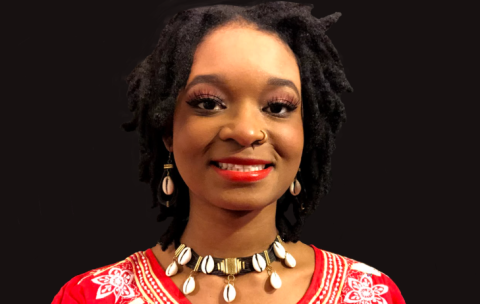Empowering Communities Through ASL/English Interpreting

***
Jordan White ’24 has had many enriching experiences working closely with interpreters and members of the Deaf community. Looking to become an ASL/English interpreter after graduation, she hopes to join a profession that helps ensure equal access to information and experiences for all.
“My interest in ASL/English interpreting started after taking ASL 1 at Manchester Community College,” she says. “I had an amazing experience in the class, and I wanted to continue learning the language and interacting with the Deaf community after transferring to UNH Manchester.”
The ASL/English interpreting program at UNH Manchester is the nation’s first accredited interpreting bachelor’s degree program. The program integrates students with the Deaf community inside and outside the classroom, developing the background and experience in Deaf culture, ASL, interpreting and ethics to become a successful interpreter.
“I chose UNH Manchester because of its well-regarded ASL/English interpreting program, which is one of 15 accredited programs in the country,” Jordan says. “I appreciate the diverse student population and how supportive they are of one another.”
With increasing recognition of the critical importance of inclusivity and accessibility, the demand for ASL interpreters is on the rise. Led by instructors who are native ASL speakers as well as experienced interpreting practitioners, students are able to get a holistic learning experience of the language, culture and interpreting process to prepare for the career.
Through the program, Jordan pursued a research project on the experiences of Deaf people during the Holocaust which she presented at the Undergraduate Research Conference. She has also been involved with the campus community as a lead peer leader and orientation leader.
“Participating in the URC has improved my public speaking skills and comfortability communicating in front of an audience,” she says. “I have also improved my leadership skills and serve as a readily accessible source of information for all students on campus throughout the semester.”
Jordan’s advice for incoming ASL/English interpreting students is to make the most out of every class in the program. Connecting with faculty and making learning fun has been key to her journey at UNH Manchester.
“Ask questions, raise your hand, and don’t be afraid to answer something wrong,” she says. “This is the time to build your foundation so you can enter the field on the right footing.”
After graduation, Jordan will work towards becoming a nationally certified freelance ASL/English interpreter and eventually attend graduate school to continue working with college students. At this year’s URC, she intends to present her capstone research project on the importance of diversity in the ASL/English interpreting profession.